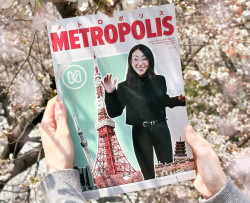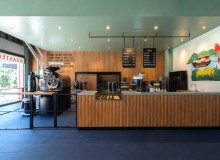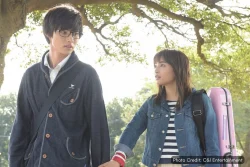
October 21, 2010
J-Wave Worldwide Showcase 2010
Cyro Baptista reflects on the global percussion explosion
Originally published on metropolis.co.jp on October 2010

Courtesy of Shalala
Recent years have seen the Blue Man Group, Stomp and Drumstruck all come to Japan—the vanguard of a percussion wave battering the planet in a frenzied beating of djembes, sticks and all manner of invented drum.
Brazilian polymath Cyro Baptista—who has his own idiosyncratic percussion show, Beat The Donkey—was there at the beginning. “I came from Brazil with my PVC pipes to the Lower East Side, and on Second Ave there was a place with a theater in the back,” he says from his current home in suburban New Jersey.
“I used to go there, and I remember these guys rehearsing in the back and they used to paint their faces blue—that was the start.”
Baptista had moved to New York in the early ’80s to back up the likes of bossa nova chanteuse Astrud Gilberto but, he quips, he wasn’t content to serve as the archetypal Brazilian with “bananas and pineapples on my head.”
“Every Brazilian thinks they are a football coach or a percussionist, but I wasn’t happy [with that]. So I incorporated other things. If you play percussion, you can play so many different instruments—you can play the environment. I come from the rainforest, with the sound of the birds and the rain, and here in New York I have the sound of the subway, the rhythm of the cars, the street—another kind of environmental source. People started to discover how percussion is part of everyday life, and I think that is the reason these shows are so successful.”
The secret to the popularity of groups like Blue Man is that they make music accessible—but Baptista says this can sometimes go too far. “People come up to me after my show and they are like, ‘Can I be in your band? I can play a piece of the refrigerator,’” he says with a laugh. “Of course they don’t know how long it took me to be able to do that. But it was great, because people watched us playing and identified with it, and that led to an explosion of percussion worldwide.”
In a career that has seen him perform with Paul Simon before 750,000 in Central Park, Baptista has also joined Japan’s iconic Kodo drummers, whose success represents a different facet of the percussion boom.
“I like very much taiko,” he enthuses in breathy, Brazilian-accented English. “The last time I went to Japan was to go to [Kodo’s home of] Sado Island. It’s an amazing place: where are you going to see a drum like that?”
Japan has long been supportive of Baptista’s music, and in return he’s backed renowned local musicians like composer Ryuichi Sakamoto and avant-garde vocalist Koichi Makigami. Whether it’s accompanying Sakamoto’s Brazilian-influenced piano music or Makigami’s improvisations, Baptista is an arresting performer with a remarkable ability to adjust to any setting.
“At the beginning of the ’80s, there were a lot of misfit musicians living on the Lower East Side—people like Marc Ribot, John Zorn. It was great, because these people were crazy, and I could be crazy,” he says. “And then we started this movement [that’s] now called Downtown Music. It was great, because I could develop my improvisational side and learn how to adapt to any situation.”
Baptista will need all the flexibility he’s got for his upcoming appearance at the annual Worldwide Showcase concert at Liquidroom, a spinoff of English DJ Gilles Peterson’s J-Wave radio show, where he’s slated to be joined by a French-Japanese singer he knows nothing about.
But before he heads to Japan, he’s got his Carnegie Hall debut to worry about. “The Carnegie concert is for my first record,” he says of his 1997 debut Vira-Loucos, in which he performs the music of the Brazilian composer Villa-Lobos. “It was with Marc Ribot, John Zorn and some other—at the time—very young musicians. Today they are very famous, and the album—my first—stayed timeless because the musicians are so fantastic. I’m going to put this group back together for Carnegie. I did this album for a Japanese label, Disk Union. They believed in me and put money behind me. It’s funny, because Japan still believes in labels. Here they don’t exist anymore. Your label is in your garage.”
“Worldwide Showcase 2010 Galaxy Session” Gilles Peterson gathers percussionist Cyro Baptista, jazz singer Akiko and others. Nov 3, 5pm, ¥5,800 (adv)/¥6,300 (door). Liquidroom, Ebisu. Tel: 03-5464-0800.







